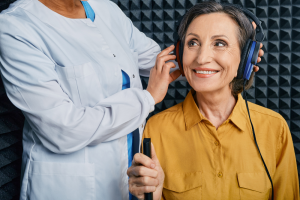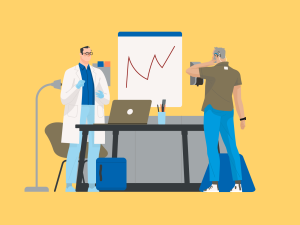Insights for Coping with COVID-19 from State Audiology Association Leaders – Northeast

Dealing with the ever-changing COVID-19 health situation in the Northeast is enough to drive you crazy. First, you can visit states next door, then you can’t or vice versa.
To help you make sense of it all, we’ve interviewed audiology association leaders in your region. Listen to each of the interviews to identify the best practices for coping with the pandemic and keeping your practice open to help patients to the degree possible. (For more insights, see other posts in this series.)
Jill McClelland, Au.D.
President of the Pennsylvania Academy of Audiology
The biggest challenge moving forward is interpreting guidelines and feeling confident in those choices.
“It’s been most challenging knowing what we’re allowed to do and not allowed to do because some of our regulations have been open to interpretation,” says Jill McClelland, Au.D.
President of the Pennsylvania Academy of Audiology. “I think that’s a little bit on purpose so we can use our best professional judgment. Sometimes that can be scary making those kinds of decisions–what hours can we be open, what services can we provide, and who can we ask to feel confident we can move forward?”
Telehealth is unlikely to replace in-person visits…but…
“Audiology is really hard to do distance. We rely on face-to-face interactions. [Telehealth] is a great option right now. I don’t think it will replace audiology services long term. We still have to be compliant with our laws. But if it’s something that can help bridge the gap between [now and] when they’re allowed to get back safely, I think it’s a good option for that.”
Listen to the full interview with Jill McClelland, Au.D. above to hear how audiology will be different when people return to the office.
Cathleen A. Alex, Au.D.
President of the Connecticut Academy of Audiology
Protocols, and who is allowed to be open, vary depending on your setting.
Response to COVID has been “highly variable depending on our settings,” says Cathleen Alex President of the Connecticut Academy of Audiology. “At the University settings, they completely shut down. Hospital settings have to treat every patient as if they were a positive COVID infection. ENTs and private practices had more autonomy. [In] a lot of larger organizations, what they were able to do was dictated by administrators above them. There were a lot of different opinions, even on whether audiologists were essential providers. We have a lot of hearing-impaired frontline workers who need to be able to hear.”
Patients still prefer in-person care.
“We’ve had [telehealth] in place for the manufacturers we work with primarily, but we’ve had very little interest from our patients in actually using it. When it’s been used, it’s been helpful, but they still prefer the in-person connection is what we’re finding.”
Hear what patients seem to be asking for and how practices are meeting those needs in the Northeast.
Want more insights on how to handle COVID-19? See what industry insiders in the Southeast region have to say.


